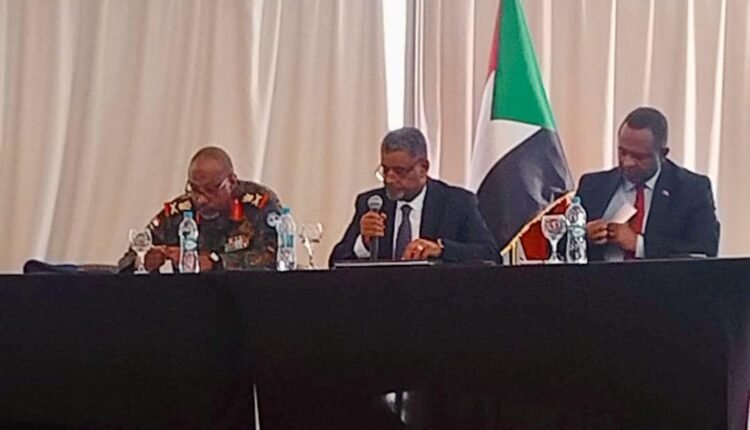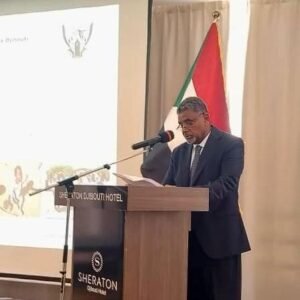Sudanese Embassy in Djibouti: SAF Plan to End Al Fashir Siege Will Be Up to Par with People’s Expectations

Djibouti – Sudanhorizon
The Sudanese Embassy in Djibouti on Thursday briefed the diplomatic missions based in Djibouti on the most recent developments in the war situation in the Sudan.
Ambassador Mohamed Saeed Hassan reviewed the dimensions of the plan that the rebel Rapid Support Forces militias had hoped to achieve, with external support and encouragement. He also debriefed the diplomats on the military situation on the ground, the violations committed by the militias, and the atrocities and dire consequences they have created for the civilians and civilian facilities.

Ambassador Hassan, Sudan’s ambassador to Djibouti, indicated that the militia’s rebellion posed the greatest challenge the country had faced since independence, posing a threat to the very existence of the Sudanese state and seeking to fragment Sudan’s unity in execution of foreign agendas.
He stated that the main goal of the rebellion was to change the identity of the state and to carry out demographic replacement, along with the systematic destruction of production centers and essential services.
He explained that the militias have used mercenaries and criminals from within Africa and outside the continent. The ambassador explained that the war would not have continued until now without the destructive foreign intervention that provided material and military supplies, including weapons and equipment. He noted that Sudan has filed a complaint against the UAE before the UN Security Council and the International Court of Justice.
For his part, the military attaché, Major General Alaa El-Din Abdullah, referred to the plan implemented by the Sudanese Armed Forces (SAF), carried out as envisaged without rushing with its components, with the intent of causing the minimal casualties among the population.
He said that the military situation, following the army and its supporting forces’ transition from a defensive to an offensive attitude, achieving significant results while inflicting heavy losses on the enemy ranks.
He explained that despite the rumors the rebel militias have been spreading, the reality on the ground contradicts these claims, citing the noticeable decline of the militia and its transition from attacking military positions to attacking civilians in the unarmed villages.
Regarding the siege of Al Fashir, he noted that the forces of the 6th Infantry Division are making good progress daily, inflicting heavy losses on the enemy in equipment and lives.
He added that the siege imposed by the militia does not harm SAF stationed there, but rather the first and final victim is the citizens.
The military attaché emphasized that SAF, which has the upper hand , prepared plans for Al Fashir and all of Darfur, and that the expected results would please the Sudanese people in general and the people of Darfur in particular.
Adviser Omar Essam has meanwhile warned of the repercussions of the militia’s war, its violations, and the dangers this poses to the region if it is not addressed.
He explained that the militias have received weapons beyond their needs, many of which were leaked into the markets and fallen into the hands of terrorist organizations.
He explained that the rebellion released more than 19,000 prisoners from Sudanese prisons during its control of Khartoum and Al-Gezira states, including terrorists and ISIS members.
He explained that terrorism typically resorts to areas with fluid security situation. Emphasizing that Sudanese intelligence, in cooperation with friendly and sister agencies, has continued to act in accordance with the professional approach to uncover the movements of terrorist organizations and groups and limit their activity.
The advisor reviewed the activities of mercenaries brought in from West Africa on an ethnic basis and from outside it by the Rapid Support Forces militia, some of whom are members of terrorist organizations, and the terrorist operations, killings, rapes and sabotage that have impacted most of the infrastructure and private and public establishments.
He also reviewed the siege imposed by the militias on Al Fashir and their intentions therein. He explained that the greatest harm is being done to the citizens with the aim of displacing them, and subjecting them to the same ordeals that happened in Khartoum, Al-Gizera, Al-Geneina, and finally Zamzam IDPs camp, where brutally killed civilians sparing nobody including elderly, women, or children, and even medical teams were assassinated.
He refuted the militia’s allegations that Zamzam was a military base, explaining that the main reason was that the camp’s residents are from specific ethnic groups targeted by the rebel Rapid Support Forces and the militias allied with them, comparing what has happened in Zamzam to what took place in Al-Geneina.
Shortlink: https://sudanhorizon.com/?p=5296

